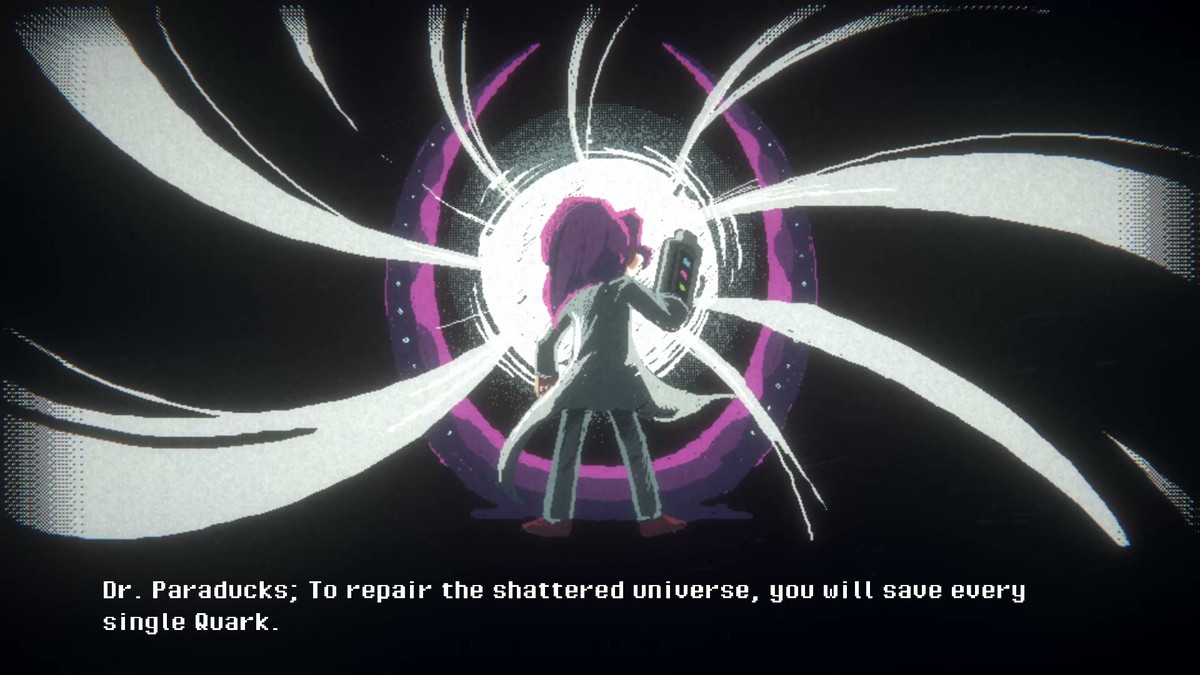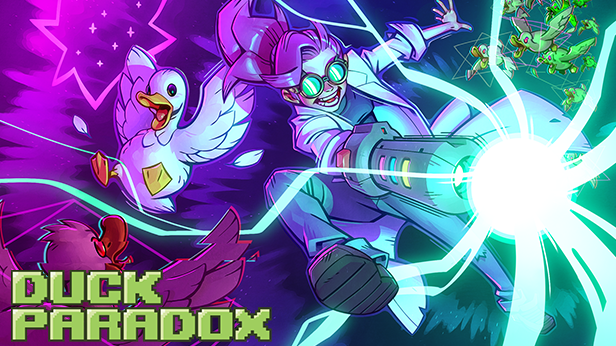Duck Paradox
Duck Paradox shows a rare level of care for an indie title. This underrated gem blends shoot-em-up and roguelike elements with a distinctive art style and a multiversal twist to create a charming yet deadly platformer. Players control Dr. Paraducks, a scientist fighting corrupted versions of her pet duck, Quark, after a time machine malfunction scattered them across dimensions. The result is a lighthearted, duck-themed adventure that impresses with its genre-mixing ambition.
Before I play a game, I typically take a glance at the Steam reviews. One stood out to me:
"Elden ring got nothing on this 11/10" - @vid
As a fan of difficult games, I felt like I could just wing it, but my confidence in my gaming abilities was quickly humbled. Roguelikes are supposed to be rewarding because as you play, you get better. In my opinion, too many games overuse meta-progression and randomization, which makes it feel like good runs come down to good luck. In Duck Paradox, I felt myself getting better with each run. It took nearly an hour for me to defeat the first boss, but now it feels so simple. Nothing changed; I just got better. It's a satisfying feeling that not many single-player games capture for me. The Elden Ring comment caught my attention because it's something that game is known for.

Bill-istic Mayhem
Like many bullet hell games, Duck Paradox is simple to learn. It's a roguelike, so you start each run with the same loadout: your raygun and chrono-ability. Each level is handmade and follows the same quest. Find your pet duck and bring them back to the time machine. When you find Quark, time rifts open up, unleashing a flock of corrupted ducks. Once you get Quark back to the time machine and eliminate a small number of corrupted ducks to fill the gauge, you complete the level and can choose from a random set of upgrades.
Easily the hardest part of this game is the bullet ricochet. Each bullet fired that doesn't collide with a target bounces around until it hits you or an enemy. Taking a single hit from an enemy (or more often than not, your own bouncing bullet) restarts the level. You can pick up shields, which protect you from a single hit before it quacks. You start with 3 retries, but occasional extra retries spawn around the level.
Some of the upgrades are simply egg-cellent, like increased slow-time energy and higher jumps. However, other upgrades will make you second-guess their efficacy, such as faster bullets, multi-bullets shots, and larger bullets. All of which are more likely to get you killed, but I believe their pros outweigh their cons. For example, the faster bullets only maintain their speed until they bounce. Larger bullets are easier to hit enemies with, which destroys the bullet. The multi-shot upgrade... that one is just more likely to kill you, but it does do significantly more damage to bosses.
After waddling through the game for a while, the levels will begin to feel repetitive, but then you'll craft the first gadget. Suddenly the levels you've gotten so used to reveal themselves to be overwhelmingly large. There were times when it felt like the level just kept going, and I had to accept that I wasn't prepared and head back.
Flock of Talent
When a game is created on a low budget, there will always be sacrifices made. Whether it's the art, the performance, the audio, or any other of the countless aspects of a game, a small, low-budget operation cannot produce a game that manages all of it well. But every once in a while, a team of talented and passionate developers and artists can create something outstanding. Duck Paradox falls in that category. They had a goal, and they accomplished each aspect well. The game looked and played well, but it also had great performance and stability, something a lot of studios don't give a duck about.
I'm sure I'll ruffle some feathers with this one, but I'm personally not a huge fan of roguelikes. I quickly fall out of interest because it feels like I'm always hoping I'm lucky enough to get a good build, and it feels like I'm wasting my time restarting every time. Duck Paradox gradually gives the player upgrades, which meant I could successfully target the build I wanted almost every run. In addition, I could clearly feel myself getting better with each attempt. In many roguelikes, after repeating the same levels over and over, I typically find myself getting impatient, going too fast and making feather-brained mistakes. In Duck Paradox, I rarely found myself doing that. As I felt more confident, I slowly picked up the pace, making the whole restarting experience less stressful for me.
A Quack in the Market
Duck Paradox waddled on to Steam and GOG after it hatched in Q4 2024 by Magic Games and published by Midwest Games. It's a hidden gem that flew under the radar, and it didn't make the splash it deserved. It's available on Windows and runs well on the Steam Deck.
I apologize for the eggcessive duck puns.
Disclosure: We received a free review copy of this product.


